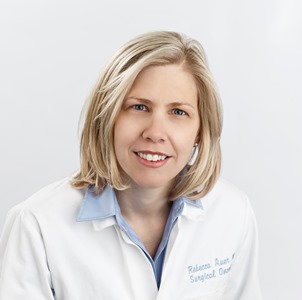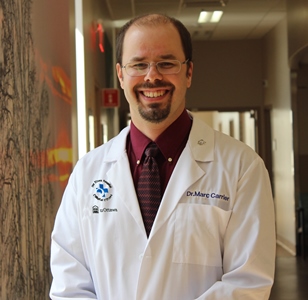 "We have come a long way in unravelling why surgery disrupts the ability of the immune system to clear cancer cells and each clinical trial teaches us more about how to prevent this effect," said Dr. Rebecca Auer.Researchers at The Ottawa Hospital have made another important step forward in their quest to find innovative ways to stop cancer from coming back after surgery.
"We have come a long way in unravelling why surgery disrupts the ability of the immune system to clear cancer cells and each clinical trial teaches us more about how to prevent this effect," said Dr. Rebecca Auer.Researchers at The Ottawa Hospital have made another important step forward in their quest to find innovative ways to stop cancer from coming back after surgery.
While surgery often provides the best option for removing all or most of a tumour, research has shown that surgery also “stresses” the body in a way that can make it easier for any remaining cancer cells spread.
Dr. Rebecca Auer, a surgeon-scientist at The Ottawa Hospital and professor at the University of Ottawa, has been investigating this phenomenon for more than 15 years and has translated four of her lab discoveries into clinical trials for patients. One of these trials, a collaboration with hematologist-scientist Dr. Marc Carrier, has now been published in The BMJ, one of the world’s top medical journals.
The trial involved heparin, a naturally-occurring compound that is commonly used to prevent blood clots. Previous research from Dr. Auer and others has shown that heparin can also make it easier for the immune system to recognize and kill cancer cells, by clearing away tiny blood clot fragments that may coat and hide cancer cells as they travel through the blood.
Cancer patients already take heparin after surgery to prevent blood clots, but there is significant debate among surgeons about how long the heparin treatment should continue (several days versus several weeks). Therefore, it was relatively straightforward for Dr. Carrier and Dr. Auer to design a clinical trial to see if a longer course of heparin could help prevent cancer from coming back after surgery, in addition to preventing blood clots.
The randomized trial enrolled more than 600 patients with colorectal cancer from 12 Canadian hospitals. Half received heparin for just a few days after surgery, while the other half received heparin for a few days before and close to two months after surgery. Although no difference was found in terms of cancer survival or blood clots after three years, the results are having a big impact.
 "This study, which is the largest of its kind, provides clear evidence that there is no benefit in a longer course of heparin in these patients. This will change practice in some centres,” said Dr. Marc Carrier.“There has been a lot of debate around the world about how long patients should take heparin or other anti-clotting drugs after surgery,” said Dr. Carrier. “This study, which is the largest of its kind, provides clear evidence that there is no benefit in a longer course of heparin in these patients. This will change practice in some centres.”
"This study, which is the largest of its kind, provides clear evidence that there is no benefit in a longer course of heparin in these patients. This will change practice in some centres,” said Dr. Marc Carrier.“There has been a lot of debate around the world about how long patients should take heparin or other anti-clotting drugs after surgery,” said Dr. Carrier. “This study, which is the largest of its kind, provides clear evidence that there is no benefit in a longer course of heparin in these patients. This will change practice in some centres.”
“We are working on a number of different strategies to boost the immune system and reduce cancer recurrence after surgery,” said Dr. Auer, who is also the director for cancer research at The Ottawa Hospital. “We have come a long way in unravelling why surgery disrupts the ability of the immune system to clear cancer cells and each clinical trial teaches us more about how to prevent this effect. I’m very thankful for all the collaboration and support we received for this study, as well as for all the patients who participated.”
Full reference: Efficacy and safety of extended duration to perioperative thromboprophylaxis with low molecular weight heparin on disease-free survival after surgical resection of colorectal cancer (PERIOP-01): multicentre, open label, randomised controlled trial. Auer RC, Ott M, Karanicolas P, Brackstone MR, Ashamalla S, Weaver J, Tagalakis V, Boutros M, Stotland P, Marulanda AC, Moloo H, Jayaraman S, Patel S, Le Gal G, Spadafora S, MacLellan S, Trottier D, Jonker D, Asmis T, Mallick R, Pecarskie A, Ramsay T, Carrier M; PERIOP-01 investigators. BMJ. 2022 Sep 13;378:e071375. doi: 10.1136/bmj-2022-071375.
Funding and support: This trial was funded by the Canadian Institute for Health Research, the Canada Foundation for Innovation, the Cancer Research Society, The Ottawa Hospital Academic Medical Organization, the University of Ottawa Faculty of Medicine and Leo Pharma, as well as through generous donations to The Ottawa Hospital Foundation. Dr. Auer holds a T1 Clinical Research Chair on Perioperative Cancer Therapeutics from the Department of Surgery, Division of General Surgery, and the University of Ottawa. Dr. Marc Carrier holds a T1 Clinical Research Chair on Cancer and Thrombosis from the Department of Medicine and the University of Ottawa. Patient recruitment at the London Health Sciences Center was subsidized through funds provided by the Department of Surgery, University of Western Ontario.
Core resources: Ottawa Methods Centre
The Ottawa Hospital is a leading academic health, research and learning hospital proudly affiliated with the University of Ottawa and supported by The Ottawa Hospital Foundation.
